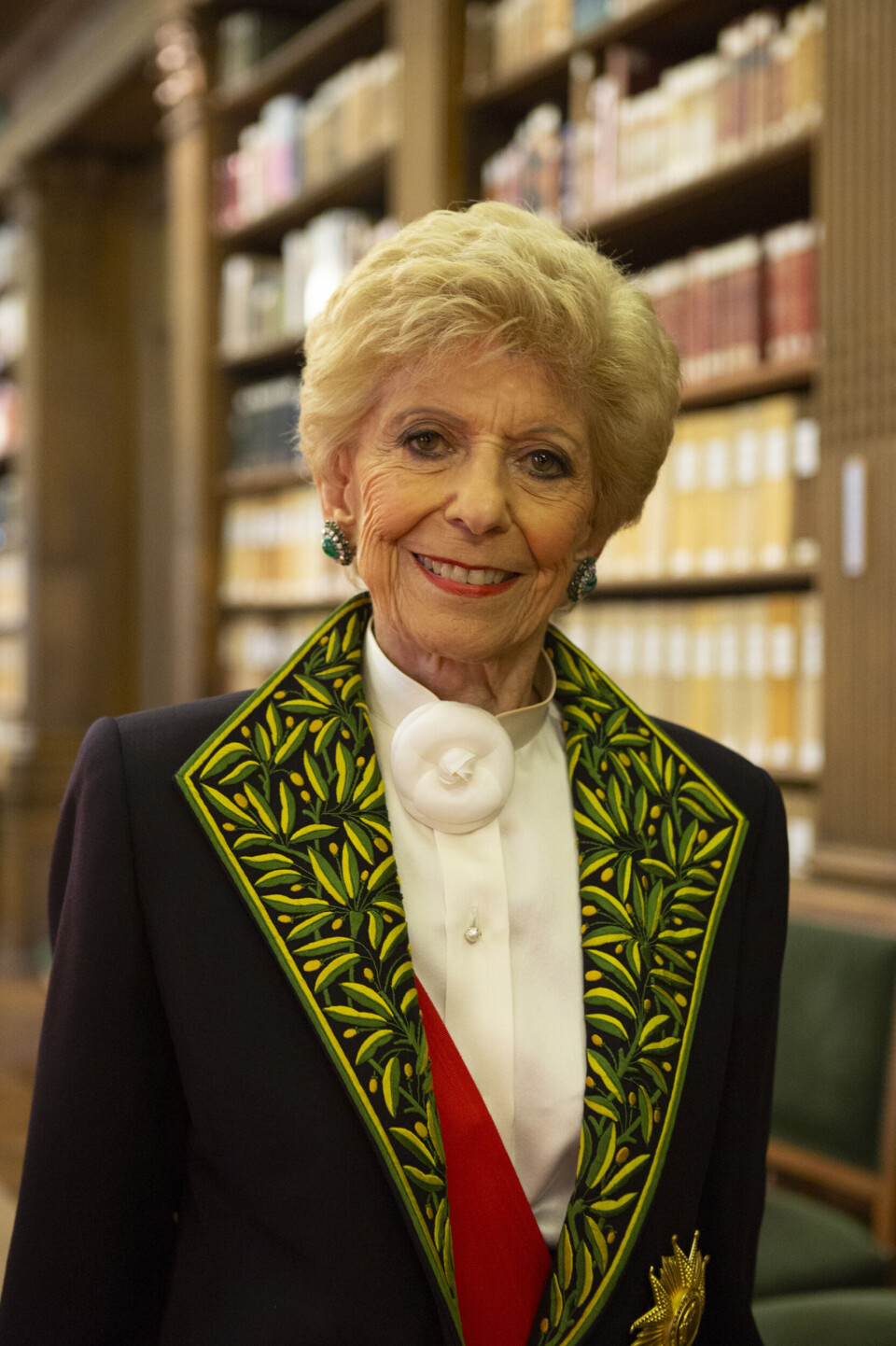-
Regional languages in France: more teaching, less speaking
Breton, Corsican, Basque: A new report assesses the state of regional language teaching nationwide
-
Six films and TV shows to improve your French this rentrée
From cultural references to new vocabulary, watching films in French is essential for your progress
-
Learning French: phrases overheard in France during la canicule
From cooking in Marseille to air-con despair, we look at some of our favourite new expressions
Meet Hélène Carrère d'Encausse, the guardian of the French language
Holding the highest position at the Académie francaise, d’Encausse explains which French book every learner should read, how anglicism impact French and the importance of grammar…

The French language is being more and more misused and impoverished, fears the lifetime chairwoman of France’s most prestigious language guardian.
Hélène Carrère d’Encausse has held the top job at France’s Académie française for 24 years as ‘perpetual secretary’ and takes its role in defence of French very seriously.
In fact, however, to the average French person she is probably best known as an expert on Russia, and it is for this second feather in her cap that she has been increasingly called on since the start of the war in Ukraine.
Le Monde calls her une grande connaisseuse. Latterly the 94-year-old, who we met at her flat overlooking the Louvre, has attracted more coverage than ever, appearing on many TV shows and granting interviews, but she has been a staple on TV discussion panels for 40 years.
She is a Russophile with German, Russian and Polish descendants, and in 2000 met Vladimir Putin, bringing to the French nation nuanced explanations about Russia and its history. But recently she has distanced herself from the Russian leader, following criticism over her position. When I asked her about Putin she looked at the recording machine – the only time she did so during the interview – clearly wanting to avoid ruffling more feathers.
That was, however, just one aspect of the interview, as Ms Carrère d’Encausse has also been the perpetual secretary of the Académie since October 21, 1999.
This is the highest and most prestigious role in this institution founded in 1635 to regulate the official usage of the French language. Being a member has made her une immortelle (an Immortal), the name given to all of the Academy’s 40 members.
Even I, as a French native, learned grammar from her during the interview, when she explained the difference between le secrétaire and la secrétaire.
The Connexion met her to discuss the issues that saw her become a remarkable figure in French public life: Russia and the influence of its empire and history, being a women at the Académie française, and the fight to maintain the prestige of French.
You wrote L’Empire éclaté (untranslated, 1978) in which you predicted the collapse of the USSR. Did you anticipate the war in Ukraine?
No. However, I knew that Europe had not found peace with Russia following the downfall of the USSR. Europe missed a peaceful transition with other nations in 1918. Following the Cold War, nobody wondered how it should organise or protect itself, or how Russia should take part. I knew it would shatter, not to mention that Ukraine was the weakest link. The reason is simple and was theorised by the Polish-American diplomat Zbigniew Brzeziński in his landmark work The Great Chessboard. Russia is not an empire without Ukraine. Mr Brzeziński was very affected by how Europe poorly manoeuvred the end of the USSR, providing little support to help Russia move toward democracy. The US left Russia in its throes in order to break it. The Americans have strategized masterfully to weaken Russia.
Read also: 10 common French sayings to improve your language skills
Is there something you missed in your analysis of Vladimir Putin?
Two things. Putin almost came to power out of luck. This was not a rational choice made by Russia. Secondly, westerners do not understand that the KGB is the equivalent of l’ENA (one of the most academically exceptional French schools), where the intellectual elite goes to learn how to govern a nation. Putin, however, was a mediocre student. He tried to don the clothes of a big leader and be closer to Europe during his first years in office. This changed after the Munich conference in 2007, when he shed his skin and returned to his roots as a spy. He seems trapped or frozen in a sort of gang. It has become a real problem, since he looks and acts almost mechanically.
What is your role as perpetual secretary of the Académie française?
The perpetual secretary runs the books. There is nothing chic about it, but it matters a lot to me. There is no president, only a committee that changes every three months. The Académie was founded in a country which had not yet been united. It became a political tool that worked to make French the official language of unified France. However, it is also a body that has since been able to work with regional languages, such as Basque and Breton. The Académie has been successful so far in its aims, but needs to continue its good work. The Académie française has heralded ‘good usage’ of the French language. Nowadays, France has greater global influence with its language than with its declining military. It is about to publish the ninth edition of its dictionary in nearly 400 years. Thanks to the Académie française, people can see how words and their definitions have evolved. Marriage is no longer ‘the union of a man and a woman’, but ‘the union of two people’, these sorts of things…
You have spoken about equality in status roles. Has the Académie française been slow to accept women into its ranks?
What is true is that women still hesitate to apply to be members. I would like them to bolster our numbers, but they hold back. I am convinced one will join us soon, but we’re not making progress fast enough on this front. But this is not because the Académie rejects women.
Would you say the Académie française is misogynistic?
No. But it carries the weight of a heavy tradition. You know, four centuries is a long time…
Read also: Ten French language basics to master before studying irregular verbs
Well, then would you say that French literature is misogynistic?
There are outstanding women writers. It is moving in the right direction. I am not denying that. Barbara Cassin and Chantal Thomas have joined us over the last five years. The former electoral system worked well in the past thanks to literary salons. Nowadays, it is done haphazardly and determined by the whims of members of the Académie, with some playing political games with candidates. Many women have come forward to let me know they would consider being part of the Académie if the election system were to change. But from an official standpoint, I do not know how to make that happen.

Is your role twice as demanding because you are a woman?
No. Nobody really pays attention. Because I am a woman, I care more about gender issues than my male predecessors, but nobody raises my gender as an issue. I am here. Take the word secrétaire for instance.
That was my next question…
My mother told me that I should never learn how to type on a machine because I would then be relegated to being a secretary, that is to serve coffee to the boss, regardless of my academic qualifications. She told me never to become a secretary. And I became a perpetual secretary.
Madame, le secrétaire in its masculine form. It is important to you. Why?
Secretary is an epicene word, which means that it retains the same gender regardless of the sex of the person to which it refers.
I was about to say it is a feminine…
We used to say ‘the secretary of the king’ in the Middle Ages. The secretary was a man, but the word is meant to qualify the holder of a job, here the secretary. La secrétaire, however, is how you might refer to the person (almost always a woman) serving coffee to the boss. The Académie considers that since the French language has no neutral, the masculine functions by default as the neutral. It means that if someone is a baker, it qualifies as a job, a neutral noun. I was elected to my position as perpetual secretary. It is a job. I hold the job, which means the word cannot switch its function from masculine to feminine. It is what it is. The Académie follows the same policy for every job. Many women have come forward to tell me that they prefer to be introduced as Madame, l’ambassadeur rather than the feminine version, Madame, l’ambassadrice.
How would you describe the French language?
It is an extremely simple language to understand. Everyone should pay attention to what it says, and the function of words. When communicating, the French language is precise and clear and conveys a straightforward message. But it is more and more misused.
Because of anglicisms?
I would not say that, because both languages have borrowed from each other a lot over the centuries. The 17th-century writer and theologian Fénelon used to say that both languages should be inspired by the other, and that one language must communicate with another. And he is right about that. I think that the significance of being clear and precise with words has disappeared. Nobody cares how important words are and what role they play in a sentence. The result is a softening of the French language that reduces its vital functional position in society.
Are you thinking of a word in particular?
No. Many words have disappeared from usage and people do not even know them. The Académie française’s dictionary exists to save words. We refuse to let them rot in a cemetery.
What advice would you give to our readers who wish to learn or improve their French?
Read. And before you ask which book, I urge them to read Les Misérables by Victor Hugo. For one hour a day. This is because its language is incomparably dense and rich. It is a beautifully written novel but also because it’s a fascinating story. You just can’t stop turning the pages.
Last question Madame, le secrétaire. Are you immortal?
Immortality is for the French language alone. This is the Académie’s credo. I am simply one chaperone of the French language.
























